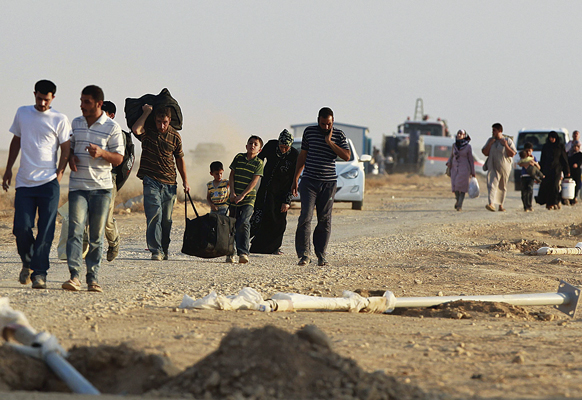by Doreen Abi Raad

BEIRUT (CNS) — Refugees from Syria are in “complete darkness” about their future, said an official with Caritas Lebanon.
Father Simon Faddoul, president of Caritas Lebanon, which has been working with Syrian refugees in Lebanon for 14 months, said there was a large influx of people during the last week of July as more than 20,000 refugees fled violence in Damascus and Homs.
“The situation we are in at the moment is terrible. What tomorrow will bring? Unfortunately, we estimate a worse situation,” he told CNS.
“The human plight and wound in this part of the world is getting deeper.”
A Catholic Relief Services (CRS) staff member chronicling the stories of refugees in border communities in Jordan and Lebanon found people fraught with concern for relatives and friends left behind as they were forced to flee the escalating violence with little advance notice.
“People are feeling generally broken and that they might not ever become whole again,” Caroline Brennan, senior communications officer for CRS, said in a telephone interview from Beirut July 31.
“The underlying feeling among Syrian refugees is this genuine deep despair for everything that is lost,” Brennan said. “They really were blinded by this happening to them. They did not expect this.”
The United Nations said July 31 that there were 34,096 displaced Syrians receiving protection and assistance in Lebanon through the efforts of the government, the U.N. and nongovernmental partners. However, Father Faddoul said the number of refugees in Lebanon is much higher.
“In my opinion, the unofficial numbers could be well over 100,000,” Father Faddoul said, pointing to the roughly 300,000 Syrian workers in Lebanon who have been bringing their families to the country as the situation in their homeland deteriorated.
Syrian refugees, Father Faddoul said, are “extremely fearful.”
“They fear to talk or to be pictured. They are afraid to give their names to the UNHCR,” leaving many people unregistered, he said.
Caritas distributed food kits, food vouchers, sheets and blankets and hygiene kits to refugees in Lebanon’s northern city of Tripoli and the Bekaa Valley region, distributing nearly 13,000 items. Brennan said CRS was working with Caritas Jordan in providing food and distributing bedding, stoves, fans and hygiene kits in the northern Jordanian communities of Ibid, Mafraq and Zarqa.
“What you see in those areas are people with war stories you don’t expect. Mothers showing bullet wounds under their dresses. Children drawing pictures in a clinic they should have no reason to draw,” Brennan said.
